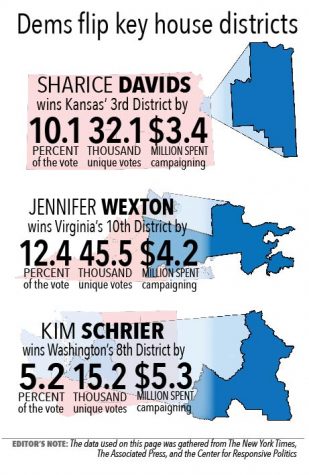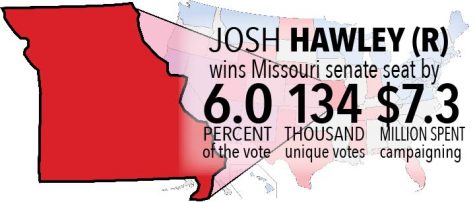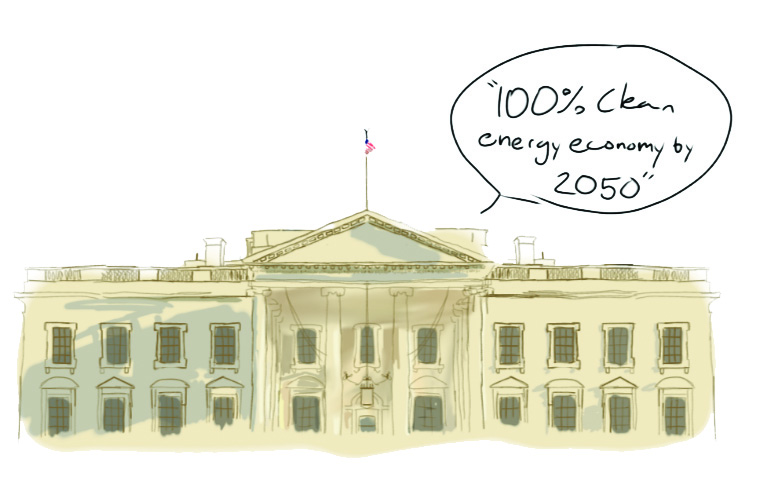Turn to pages 10-11 above to see the full layout of this article.
Americans across the nation gathered at polling stations and dropped ballots in mailboxes in a one-night affair to decide the future of the United States. The Congressional midterm elections on Nov. 6 have come and passed, and the majority of the results are in. The results will impact the futures of both Washington and the United States as a whole.
THE HOUSE
The Democratic party exited the 2008 election cycle triumphantly, having won control of the House of Representatives, the Senate and the Presidency. In the 2010 midterms, however, the Republicans seized control of the House, continuing a trend of opposition control of the House of Representatives that had begun in 1994 during the Clinton administration. In 2014, the Republicans won the Senate as well, leaving President Barack Obama with an uncooperative Congress for his last two years.
 Donald Trump’s 2016 election as President of the United States marked a complete reversal from the 2008 Democratic sweep and the beginning of Republican control of the House, Senate and Presidency. The successful nomination of Brett Kavanaugh to the Supreme Court cemented conservative control over the Supreme Court and the Justice Department, leaving the Republican party in control of all three branches of government.
Donald Trump’s 2016 election as President of the United States marked a complete reversal from the 2008 Democratic sweep and the beginning of Republican control of the House, Senate and Presidency. The successful nomination of Brett Kavanaugh to the Supreme Court cemented conservative control over the Supreme Court and the Justice Department, leaving the Republican party in control of all three branches of government.
Because of this, the 2018 midterm was especially important for the Democratic party, who, if they did not regain control of at least a portion of the legislature, could face two more years of complete Republican control of government. The Democrats found a glimmer of hope in the House of Representatives’ tendency to flip houses when the Presidency changes parties – one that they clung to desperately. Although both parties flooded competitive districts with campaign spending, with the Center for Responsive Politics reporting that the $5.2 billion in campaign funds spent during this election cycle makes this the most expensive midterm in history, the Center also found that Democrats outspent Republicans by almost $450 million across all races for both the House and Senate.
That money has seen many key seats swap from Republican to Democratic control. Democrat Sharice Davids, a lesbian former MMA fighter of Native American descent, won Kansas’ 3rd district, which includes the portion of Kansas City in Kansas and its surrounding boroughs by 8.5 percentage points over incumbent Kevin Yoder. The race in Virginia’s 10th District saw Republican incumbent Barbara Comstock lose to Jennifer Wexton by over 46 thousand votes. In our own state, Democratic pediatrician Kim Schrier won the race for the 8th District over career politician Dino Rossi by 5.4 percentage points. With $25 million in spending, including $16 million by outside donors, the race to replace retiring Republican incumbent Dave Reichert was the costliest Congressional election in state history.
A staggering 32 House seats flipped from Republican control to Democratic, catapulting the Democrats to a majority in the House of Representatives. The House of Representatives currently stands as 227 Democrats and 198 Republicans. Ten seats, all currently Republican-controlled, have yet to be called in favor of either party, but in four of those races Democrats appear to have the lead.
SENATE
In contrast with the House, there were few major upsets in the Senate. Aside from a few close races in key swing states, the election proceeded in line with pollsters’ expectations: Republican candidates took loosely-held Senate seats in states that voted for Trump in 2016. In Nevada, Democrat Jacky Rosen won the seat over incumbent Dean Heller, whose support for President Trump cost him votes in a state that Hillary Clinton carried in 2016 by 2.5 percentage points; Rosen out-fundraised Heller by over $7 million, according to the Center for Responsive Politics. In Arizona, a closely-contested race saw Democrat Kyrsten Sinema victorious over Republican Martha McSally. Sinema will replace retiring Republican Jeff Flake, whom President Trump had spurned following continued criticism by the senator.

Perhaps the closest race this year is between Republican Rick Scott and incumbent Democrat Bill Nelson in Florida. Scott is currently governor of Florida, though term limits bar him from seeking re-election. He is also a successful businessman, having founded co-founded a successful hospital chain now part of the largest for-profit healthcare company in America. His own personal wealth contributed in large part to the over-$30 million gap in funding reported by the Center for Responsive Politics. Despite the gulf in funding, Nelson lost the Senate race by just 0.1 percent of the vote. In Florida, races that end with the winning candidate less than 0.5 percentage points ahead of the runner-up must automatically be recounted; the result could change at a later date.
Though a special election to replace longtime Mississippi Republican Senator Thad Cochran, who resigned in April over health concerns, went to runoffs which will be held on Nov. 27, it is extremely unlikely that Democratic candidate Mike Espy will prevail over Republican Cindy Hyde-Smith, since about 150,000 Republican votes went to a second Republican candidate, Chris McDaniel in the election on Nov. 6. If those votes go to Hyde-Smith in the runoffs, Espy will find himself over 15 percentage points behind the Republican.
WASHINGTON ELECTIONS
Here in Washington, results came through in line with pollsters’ expectations. Republican and Democratic incumbents in the vast majority of districts won re-election campaigns convincingly. The only representative who did not win reelection is the retiring Republican Dave Reichert from the 8th District. The 8th District has seen increased urban development in recent years; urban areas tend to vote Democratic. That could explain why Democratic pediatrician Kim Schrier became the first Democrat to represent the district since its creation in 1983, despite the fact that the district has carried Democratic presidential candidates every cycle since 1992.
This race was particularly important not only to its residents but also to the parties at-large, as evidenced by the high spending in the district by both of the campaigns and outside donors. With the flipping of the 8th District, Democrats now hold seven of Washington’s ten Congressional districts.
Another interesting race, albeit with an expected result, was between Republican incumbent Jaime Herrera Beutler and Carolyn Long for the Third District in southern Washington. Though Herrera Beutler has steadily rebuffed opposition from Democratic opponents for seven years running, this year, the Democrats’ 2.9 percent margin of defeat was significantly smaller than the >10 percent margins of defeat in years past. If these relatively close races can be expected going forward, there is a real chance that the district could flip in the future, further cementing Democratic hold over the state.
Washington has long been a blue state, every year we see ambitious new ballot initiatives seeking to further liberal programs and agendas. This year, noteworthy examples passed include I-940, requiring de-escalation training for police officers and establishing a standard to determine valid uses of lethal force and I-1639, which tightens gun control laws.
Under 1639, anyone under the age of 21 may not purchase semi-automatic rifles, which automatically chamber a new round using energy expended by the firing of the previous round; under existing laws, people under 21 cannot purchase a handgun. Manual-action rifles, which requires external action (such as bolts, pumps, slides or levers) to chamber a round after firing, may still be purchased at age 18. Notably, under 1639, gun owners whose weapons are used in a crime by someone who should not have had access to that firearm may also face criminal charges of “community endangerment” if they did not secure their weapon in a gun safe with a trigger lock or similar device.
I-1634 also passed, preventing any state municipalities from establishing taxes on grocery items, defined by the initiative as “any raw or processed food or beverage, or any ingredient thereof, intended for human consumption.”
The remaining initiative on the ballot, I-1631, which would have required carbon emitters to pay a fee per metric ton of carbon produced, failed to gain approval by voters.
Now that the only truly contested district in the state has gone blue, and now that Washington’s voters have implemented some of the strictest gun control laws in the country, Washington has cemented itself as one of the most liberal states in the nation. In the coming years, with the increasing urbanization of the Washington area and expansion of the Seattle metropolitan area, one would not be remiss to believe that the state will only become bluer.














